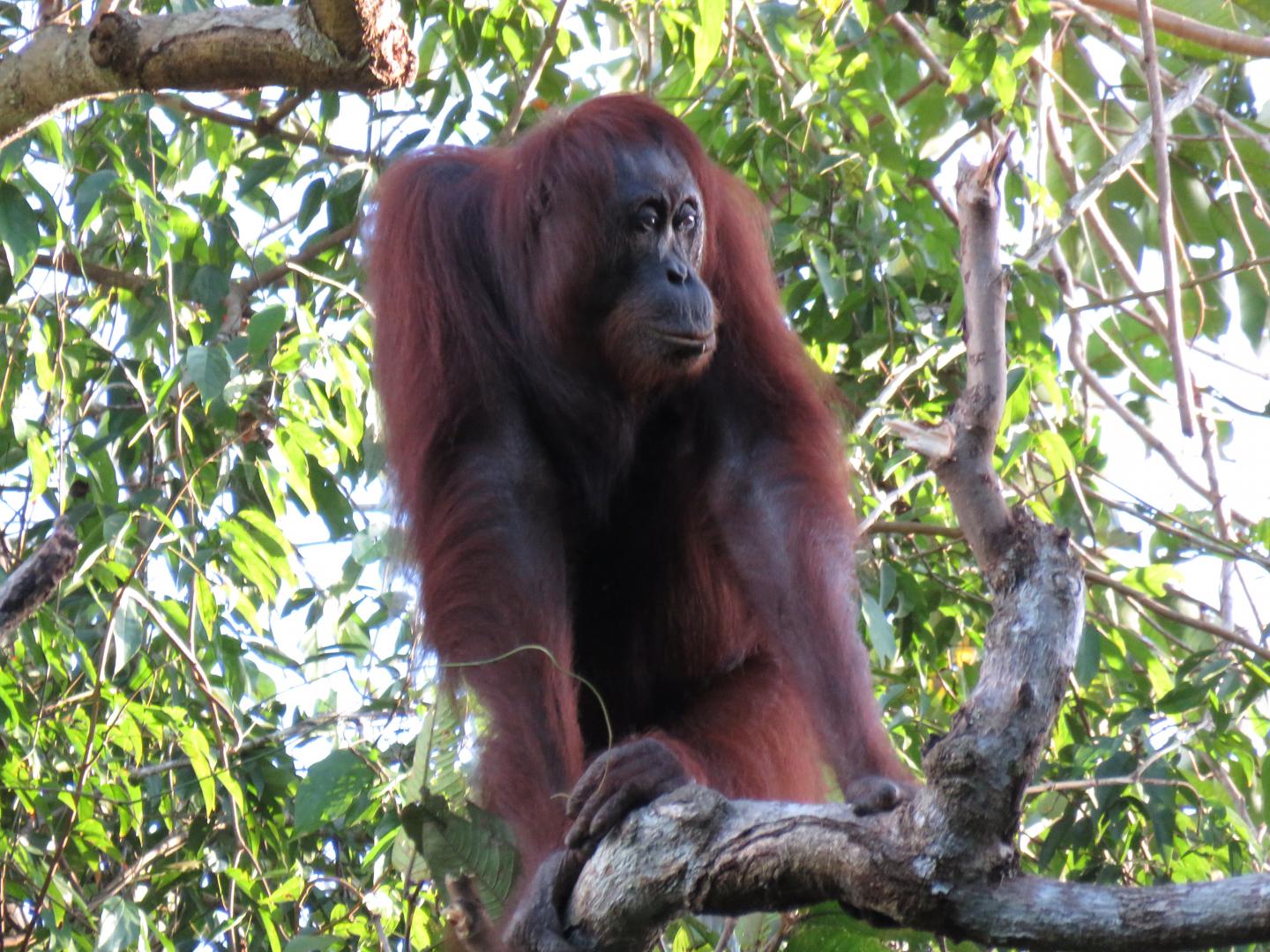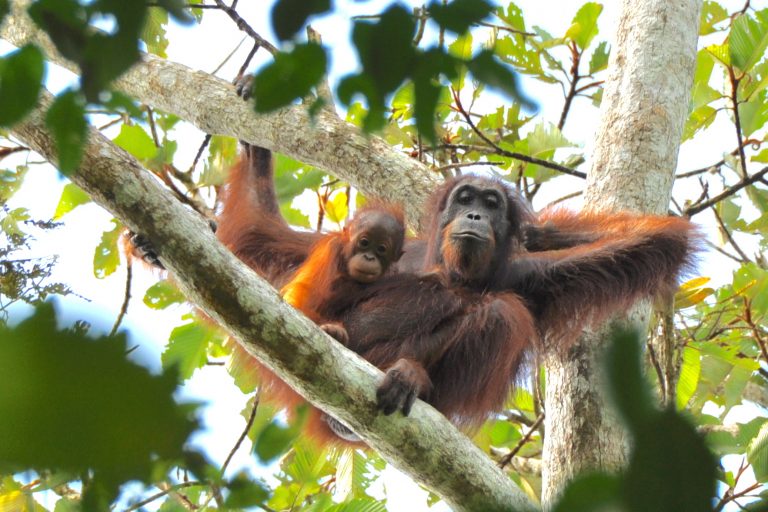- hot-spots
- biodiversity
- Malaysia
- Orangutans disappear Indonesia and Malaysia

Orangutans disappear Indonesia and Malaysia
Malaysia, Indonesia
last update:
9 months agoProblems
Orangutans are in crisis. Asia’s only great ape species are declining rapidly due to habitat loss, illegal killing, and wildfires. Found on the islands of Borneo and Sumatra, all three species of orangutans (Bornean, Sumatran, and Tapanuli) are classified as Critically Endangered by the International Union for Conservation of Nature (IUCN). An estimated 148,500 orangutans vanished from Borneo’s forests between 1999 and 2015. By 2050, an additional 45,300 will be lost based on current rates of habitat destruction. Sumatran orangutans face similarly bleak prospects. Scientists predict that the total Sumatran orangutan population may decline by nearly one-third by 2030. The Tapanuli orangutan, only identified as a separate species in 2017, consists of less than 800 individuals and faces the most immediate risk of extinction of the three species
Cause of Decline
Forest destruction Destruction of Borneo and Sumatra’s rainforests is the biggest threat driving orangutans toward extinction. From 2016 through 2019, 797,054 ha of orangutan habitat was deforested in Indonesia and Malaysia, according to an analysis of Indonesian Government forest loss data by EIA and MapHubs. The vast majority (739,249 ha) occurred in Indonesia only, accounting for a fifth of all deforestation across the country during this time period. If this loss rate continues, orangutan forests could largely disappear, with them three of the Earth’s most iconic species. Illegal Killlings of Orangutans Often closely linked to habitat destruction, the illegal killing of orangutans is a key driver of orangutan population decline. Human-orangutan conflict, poaching for meat, and fear of wild orangutans are among the core motivations for orangutan killing, which, on average, claim the lives of an estimated 2,200 Bornean orangutans each year. This illegal killing, in turn, fuels the illegal capture and trade of live orangutans. Infant orangutans are sometimes kept as pets in Indonesia. They are also trafficked internationally to buyers in Asia, the Middle East, and Europe for the pet trade or to supply zoos and similar wildlife exhibition facilities. Orangutans stay with their mothers for the first eight years of their lives, so it can be assumed that at least one adult female orangutan was killed for every baby orangutan that enters into trade. Killing, capturing, possessing, and trading in orangutans is prohibited under Indonesian law. Fire Fire-setting to clear land for agricultural production often results in out-of-control wildfires that burn in and around orangutan habitat. These wildfires directly cause orangutan deaths and drive orangutans out of the forest, where they are likely to come into conflict with humans as they seek refuge in agricultural lands or risk starvation if their access to food resources is cut off. The Indonesian and Malaysian Governments have prosecuted a handful of companies for their role in the spread of wildfires linked to their concessions but have struggled to enforce court-ordered penalties and appear to be reluctant to revoke the licenses that allow companies to continue operating their concessions. Looking Ahead This is no time for apathy; the current outlook for orangutans is dire. Indonesia and Malaysia have the expertise and capacity to protect critically endangered orangutans and reverse their population decline if they desire. Achieving this will require political will at the highest levels and ambitious goal-setting in order to leverage the Indonesian and Malaysian government’s considerable resources to take the steps necessary to save these irreplaceable species. We can rewrite the narrative by supporting conservation efforts, advocating for sustainable practices, and reducing our environmental footprint.
Gallery
4Timelines
2020
Despite laying claim to the world’s third-highest rate of deforestation, Indonesia encouragingly reduced its primary forest loss to the lowest levels achieved by the country since 1990.
2019
SRAK’s goal of 45,590 Bornean orangutans to be conserved is far lower than the upper estimated population for Bornean orangutans of 62,230 identified in the 2016 PHVA analysis, and significantly lower than other peer-reviewed Bornean orangutan population estimates. By setting specific target numbers rather than committing to protect all remaining orangutans, the government of Indonesia signals a willingness to accept further declines in the orangutan population.
2018
President Joko Widodo signed a three-year moratorium on all new licenses for palm oil plantations, which was allowed to expire in September 2021. The order applied to projects that obtained some, but not all, permits and also included a directive for relevant central and regional governments to review their palm oil licensing data. Companies that obtained all necessary permits before the moratorium announcement were allowed to proceed with forest clearance, and the recent adoption of the Omnibus Jobs bill now provides an avenue to legalize palm oil concessions that have been operating illegally in designated Forest Areas.
2017
A survey found that the number of orangutans in central areas was about 5,933, compared with 5,376 in 2002. It also discovered about 1,000 apes living in the southwest of the state.
2005
TRAFFIC concluded that at least 200–500 Bornean orangutans were traded annually in Indonesia.80 Because mothers are killed to obtain infants, these findings mean that at least 400–1000 orangutans were removed from the wild to supply the trade. More recent studies suggest that Bornean orangutan trade levels have remained high.

![Orangutans are found only on the islands of Borneo and Sumatra eating fruit, leaves, and flowers and building their nests high in the canopy [EPA]](https://res.cloudinary.com/djgesv2ry/image/upload/v1725991630/201232992715287580_20_qgbhwl.webp)
